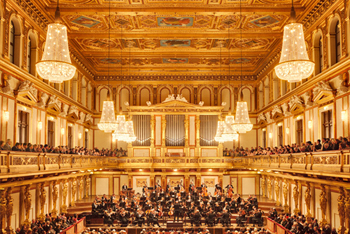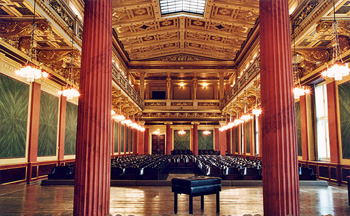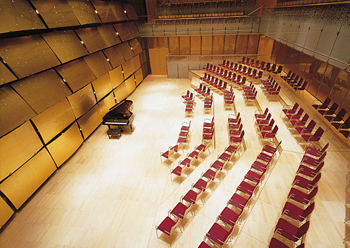Vienna Philharmonic Orchestra | Musikverein - Golden Hall
Mo | Tu | We | Th | Fr | Sa | Su |
Program and cast
October 17, 2024
Vienna Philharmonic
Andris Nelsons, conductor
Program
Dmitri Shostakovich
Symphony No. 9 in E-flat Major, Op. 70
- Intermission -
Antonín Dvořák
Symphony No. 7 in D Minor, Op. 70
October 19, 20, 2024
Vienna Philharmonic
Andris Nelsons, conductor
Midori, violin
Program
Sergei Prokofiev
Violin Concerto No. 1 in D Major, Op. 19
- Intermission -
Gustav Mahler
Symphony No. 5
November 23, 24, 26, 2024
Vienna Philharmonic
Alain Altinoglu, conductor
Sophie Dervaux, bassoon
Program
Bruno Hartl
April. Ballade for large orchestra, Op. 39
André Jolivet
Concerto for bassoon, string orchestra, harp, and piano
- Intermission -
Hector Berlioz
Symphonie fantastique, Op. 14, "Episode de la vie d’un artiste"
December 13, 14, 15, 2024
Vienna Philharmonic
Klaus Mäkelä, conductor
Program
Gustav Mahler
Symphony No. 6 in A Minor, "Tragic"
December 30, 2024
Vienna Philharmonic
Riccardo Muti, conductor
Program
Preview of the New Year’s Concert
End approximately at 1:30 PM
December 31, 2024
Vienna Philharmonic
Riccardo Muti, conductor
Program
New Year’s Concert
End approximately at 9:55 PM
January 1, 2025
Vienna Philharmonic
Riccardo Muti, conductor
Program
New Year’s Concert
End approximately at 1:45 PM
January 11, 12, 13, 14, 2025
Vienna Philharmonic
Zubin Mehta, conductor
Pinchas Zukerman, violin
Program
Wolfgang Amadeus Mozart
Violin Concerto in G Major, KV 216
- Intermission -
Anton Bruckner
Symphony No. 9 in D Minor
February 15, 16, 2025
Vienna Philharmonic
Riccardo Muti, conductor
Program
Franz Schubert
Symphony No. 4 in C Minor, D 417, "Tragic"
- Intermission -
Anton Bruckner
Symphony No. 7 in E Major
February 18, 2025
Vienna Philharmonic
Riccardo Muti, conductor
Program
Wolfgang Amadeus Mozart
Symphony in C Major, KV 551, "Jupiter Symphony"
- Intermission -
Antonín Dvořák
Symphony No. 9 in E Minor, Op. 95, "From the New World"
February 22, 23, 2025
Vienna Philharmonic
Riccardo Muti, conductor
Program
Alfredo Catalani
Contemplazione. Prelude for Orchestra, Op. 26
Igor Stravinsky
The Fairy's Kiss. Divertimento for Orchestra
- Intermission -
Franz Schubert
Symphony No. 8 in C Major, D 944, "Great C Major Symphony"
March 15, 16, 17, 18, 2025
Vienna Philharmonic
Yannick Nézet-Séguin, conductor
Yefim Bronfman, piano
Program
Ludwig van Beethoven
Piano Concerto No. 3 in C Minor, Op. 37
- Intermission -
Richard Strauss
Ein Heldenleben. Tone poem for large orchestra, Op. 40
March 29, 30, 2025
Vienna Philharmonic
Christian Thielemann, conductor
Christiane Karg, soprano
Piotr Beczała, tenor
Program
Pasticcio with music, arias, and duets from operettas by Johann Strauss II
April 5, 6, 8, 9, 2025
Vienna Philharmonic
Christian Thielemann, conductor
Augustin Hadelich, violin
Gautier Capuçon, cello
Program
Johannes Brahms
Concerto for Violin and Cello with Orchestra in A Minor, Op. 102, "Double Concerto"
- Intermission -
Johannes Brahms
Symphony No. 4 in E Minor, Op. 98
May 2, 3, 4, 2025
Vienna Philharmonic
Mirga Gražinytė-Tyla, conductor
Yuja Wang, piano
Program
Raminta Šerkšnytė
Midsummer Song
Pyotr Ilyich Tchaikovsky
Piano Concerto No. 1 in B Minor, Op. 23
- Intermission -
Jean Sibelius
Lemminkäinen and the Maidens of Saari. Legend, Op. 22/1
The Swan of Tuonela. Legend, Op. 22/2
Lemminkäinen Returns Home. Legend, Op. 22/4
May 26, 2025
Vienna Philharmonic
Thomas Adès, conductor
Igor Levit, piano
Program
Joseph Haydn
Symphony in A Major, Hob. I:64, "Tempora mutantur"
Thomas Adès
Piano Concerto
- Intermission -
György Kurtág
Petite musique solennelle in homage to Pierre Boulez
Pierre Boulez
"Messagesquisse" for seven cellos
Leoš Janáček
Taras Bulba. Rhapsody for Orchestra after a legend adapted by Nikolai W. Gogol
June 6, 7, 8, 10, 2025
Vienna Philharmonic
Franz Welser-Möst, conductor
Elīna Garanča, mezzo-soprano
Daniel Behle, tenor
Program
Joseph Haydn
Symphony in C Minor, Hob. I:52
- Intermission -
Gustav Mahler
Das Lied von der Erde. Symphony for two solo voices and orchestra after Hans Bethge's "The Chinese Flute"
Musikverein Golden Hall
This building is located on Dumbastraße/Bösendorferstraße behind the Hotel Imperial near the Ringstraße boulevard and the Wien River, between Bösendorferstraße and Karlsplatz. However, since Bösendorferstraße is a relatively small street, the building is better known as being between Karlsplatz and Kärntner Ring (part of Ringstraße loop). It was erected as the new concert hall run by the Gesellschaft der Musikfreunde, on a piece of land provided by Emperor Franz Joseph I of Austria in 1863. The plans were designed by Danish architect Theophil Hansen in the Neoclassical style of an ancient Greek temple, including a concert hall as well as a smaller chamber music hall. The building was inaugurated on 6 January, 1870. A major donor was Nikolaus Dumba whose name the Austrian government gave to one of the streets surrounding the Musikverein.
Great Hall - Golden Hall
 “As high as any expectations could be, they would still be exceeded by the first impression of the hall which displays an architectural beauty and a stylish splendour making it the only one of its kind.” This was the reaction of the press to the opening of the new Musikverein building and the first concert in the Großer Musikvereinssaal on 6 January 1870.
“As high as any expectations could be, they would still be exceeded by the first impression of the hall which displays an architectural beauty and a stylish splendour making it the only one of its kind.” This was the reaction of the press to the opening of the new Musikverein building and the first concert in the Großer Musikvereinssaal on 6 January 1870.
The impression must have been overwhelming – so overwhelming that Vienna’s leading critic, Eduard Hanslick, irritatingly brought up the question of whether this Großer Musikvereinssaal “was not too sparkling and magnificent for a concert hall”. “From all sides spring gold and colours.”
Brahms Hall
 "In order not to promise too much it can be said that it has been made into the most beautiful, most magnificent, perfect example of a chamber concert hall that any of us knows in the world.” This was the reaction of a Vienna daily newspaper in October 1993 as the Brahms-Saal was presented to the public after extensive renovation work.
"In order not to promise too much it can be said that it has been made into the most beautiful, most magnificent, perfect example of a chamber concert hall that any of us knows in the world.” This was the reaction of a Vienna daily newspaper in October 1993 as the Brahms-Saal was presented to the public after extensive renovation work.
The surprise was perfect. It was a completely new hall. In contrast to the Grosse Musikvereinssaal, the Brahms-Saal had changed its appearance quite considerably over the years. When and how it acquired that slightly melancholy duskiness that was known to music lovers before 1993 cannot be precisely documented.
Glass Hall
 As a venue for events from concerts to luxury banquets, the Glass Hall / Magna Auditorium is not only the largest of the Musikverein's 4 new halls but also the most flexible in terms of usage.
As a venue for events from concerts to luxury banquets, the Glass Hall / Magna Auditorium is not only the largest of the Musikverein's 4 new halls but also the most flexible in terms of usage.
Hub podiums enable the smooth transformation of the concert hall into a conference centre, the cinema into a ballroom, or the stage into a catwalk. State-of-the-art equipment for sound, lighting, video and widescreen digital projection provide the ideal conditions for half-scenic productions.
The Glass Hall / Magna Auditorium was designed by the Viennese architect Wilhelm Holzbauer. With a height of 8 metres, the hall (including the gallery) can play host to up to 380 visitors.

 EN
EN DE
DE IT
IT FR
FR ES
ES RU
RU JP
JP RO
RO
 Seating plan
Seating plan 





